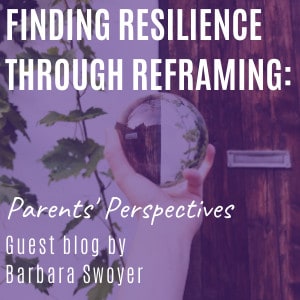As a Dravet parent or caregiver, have you ever thought about the term “reframing?” This week’s guest blog post comes from Barbara Swoyer, who recently wrote about the concept of reframing for the latest issue of NIH MedLine Plus magazine. In this piece, Barbara incorporated the thoughts of others in the Dravet community about what reframing means to them, and how it might be helpful, or even not, when caring for a medically complex child.
Barbara and her husband live just outside of Boston, MA. They are the parents of two boys, and their younger son, Jake, has Dravet syndrome with Secondary Mitochondrial Dysfunction. Not diagnosed until age 10, Jake is now in his twenties and lives at home full time with his parents. Barbara has been involved with the epilepsy and special needs community for over two decades as a fundraiser, volunteer, written contributor and advocate. She is a member of the Caregivers of Adults Advisory Group for the Dravet Syndrome Foundation, and is a founding Parent Advisor for Courageous Parents Network.
re·frame
1. place (a picture or photograph) in a new frame.
2. frame or express (words or a concept or plan) differently.
Caring for a child with a rare disease is stressful and unpredictable. As parents, no matter the age of our child, or where we are on our journey, we face similar problems. We are tired and overwhelmed and deal with continuous challenge and change. At times we may feel sad, unable to cope, afraid for our future, or paralyzed by indecision. Often, we are so consumed with the daily care that it is hard to see the big picture. We need help and emotional support.
I hadn’t considered the term reframing until I was invited to write about it. Nearly 25 years into caring for my son, I undoubtedly have experience with reframing, though I’m not always aware of doing it. I posed the question of how we experience reframing to parents of children with Dravet syndrome who, like myself, have spent many years caring for a fragile, medically-complex child. This is what we wish to share.
Reframing can be helpful at diagnosis. Using information as a path to the right experts, treatment, services and community of other parents can be a positive way to reframe what is often a devastating moment. “Waiting for genetic results, I was terrified. When it came back positive, we shifted to: at least we finally know what we are dealing with and won’t treat it incorrectly like we did before.”
Reframing can shift our perspective when we feel overwhelmed by sadness and loss. “I change the way I think about things that make me sad. When I get overwhelmed by thinking about what she won’t experience, or about the constant care she needs, I stop and think: my daughter is happy, she isn’t grieving for what she has lost or is going through. For that I am grateful.”
“I find reframing helpful when I start to feel overwhelmed with the ways this disease impacts what we can\’t do. Instead, I think about what we can do, what we do have control over.”
It can help us cope with emotional pain. “If we allowed ourselves to feel the hurt all the time, that would be crippling. Maybe reframing is a coping mechanism, so we can get on with our lives to some extent. It\’s healthy to feel the hurt and then work through it in our own way.”
And alleviate our guilt. “I have always stressed about why my son’s seizures have occurred. His neurologist explained that quite often there is no reason. It’s part of his disease. I took this advice and now don’t stress over the reason. I just deal and move forward.”
Reframing helps us make hard decisions. “I was open to changing my decision if (my provider) could present me with appropriate and accurate information. I can change my viewpoint based on good information and seeing something from another’s perspective.”
By watching others, we reframe our own challenges. “I gain perspective and can reframe my challenges. I see that others have similar or more challenging burdens. I see them getting through difficult situations and this gives me strength to go on.”
It helps us let go and accept that others can care for our child too. “It helps me to feel positive that they have her best interests at heart and that\’s she\’s safe and well cared for. They won\’t ever take our place, but I have a positive attitude towards her care. This took time, but I did reframe from, ‘they will never look after her the way I do’ to ‘they go above and beyond what is expected of them’, and that really helps.\”
Reframing can help us deal with decline. “It took a long time to accept that she\’s now in a wheelchair. I kept thinking back to when she walked, and it was painful. I tell myself that there are thousands of people in wheelchairs, still living a life, and so is she. She is happy most of the time. If she\’s happy then so should I be. Reframing can be powerful, but it\’s not always easy to do.”
Reframing our idea of what’s important allows us to adjust our expectations and focus on moments of joy. “What we were living right now was most important. Comparing what you could do before, or worrying about the future, robbed the peace and joy from the moment. I let my son do all he could because I never knew if this was his last time. Many things are just as joyous to remember as they were to do.”
“Pushing too hard on skills that were not coming or were lost and not returning was stealing joy from our moments. Who cares if things are age-appropriate or not? Does it bring him joy?”
We wonder if reframing might not always be a positive thing. “Is it avoidance rather than reframing? We probably ‘reframe’ to avoid feeling the hurt. Is this healthy in the long run?”
“I wonder if it’s healthy to placate myself all the time in this way. To continue to look for the silver linings, rather than allowing myself to feel.\”
It can make us feel defensive. We don’t always feel receptive to it. Sometimes it feels exhausting and hard. “When we are having a bad day and others try to reframe my thinking to be more positive it makes me quite cross! It feels they are belittling what has happened or what we are going through.”
“Sometimes other people attempting to change your perspective gets my back up! When you are in the middle of a crisis it can feel patronizing and belittling.”
“It’s finding the balance. I have days when I reframe and find the good in the situation and days when I just simply can’t do that.”
Through these examples, we can better understand when and how parents might gain strength through reframing. As one mother summarized, “reframing has been pivotal in accepting our journey.” Reframing might look different for everyone, but it can be a powerful tool for helping parents cope, shift perspective and meet the challenges of their journey as caregivers






